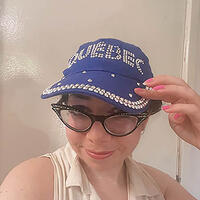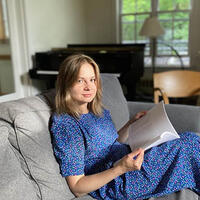Instructional Development Research Projects
Chinese Learning: From Textbooks to Everyday Life
Zijing Fan
Graduate Student, East Asian Languages & Cultures
My project includes four modules to help first-year Chinese students to apply their language skills. The modules have two pieces: 1) exercises based on selected clips from Chinese cultural productions, such as movies, TV series, and online videos; and 2) activities to practice Chinese on campus and in local Bay Area communities. Throughout this project, students review what they learn from the textbook, and then also experience the pragmatic nuance of language in a contemporary Chinese cultural context.
Bio: Zijing Fan (Tracy) is a Ph.D. candidate in EALC. She received her B.A. and M.A. in Classical Chinese Literature from Fudan University, China. She has been teaching first-year Chinese for four semesters. She is now working on a project to bridge the gap between classroom learning and real-world language use. This project involves supplementing traditional textbook content with real-time Chinese media, such as social media posts and productions from popular culture. By integrating these authentic materials, she aims to help students develop more relevant and up-to-date language skills.
Gender in/and French: Teaching Inclusive French in the First-Year Language Classroom and Beyond
Jennifer Kaplan
Graduate Student, French
I present two separate but related projects united in the goal of expanding student knowledge of the complex interface between human and grammatical gender in the French language: (1) at the elementary level, three French 1 modules designed to raise students’ metalinguistic awareness of inclusive French strategies, their reception, and their importance for queer and trans French-speakers and (2) at the graduate level, a syllabus on language and gender in French.
Bio: Jennifer is a PhD Candidate in the Romance Languages and Literatures Program (French). Her dissertation focuses on language practices among queer, trans, and non-binary Francophones in Montreal; more broadly, her work encompasses lavender sociolinguistics, trans linguistics, and corpus linguistics. She has taught in the French and Gender and Women’s Studies departments.
Teaching Russian Lexically
Elena Leonenko
Graduate Student, Slavic Languages & Literatures
My project explores the application of the lexical approach to teaching Russian. This instructional approach focuses on “language chunks” (words that often occur together) rather than on isolated vocabulary items and grammatical structures. In my presentation, I will introduce a set of exercises informed by the lexical approach for three levels of instruction: Elementary, Intermediate, and Advanced. I believe that these activities raise students’ awareness of the idiomatic nature of the language and allow them to achieve fluency in Russian.
Bio: Elena Leonenko is a Ph.D. Candidate in the Department of Slavic Languages and Literatures; her dissertation examines the interactions of poetry and visual arts in Russian and European Modernism. She also holds an M.Phil. in Russian literature from St.Petersburg State University and an MA in REEES from the University of Oregon. She taught all levels of the Russian language at the University of Oregon, UC Berkeley, and Middlebury Russian School.
Four Languages for the Price of One? Teaching Speakers of Scandinavian Languages to Read their Neighbor-Languages’ Texts
John Prusynski
Lecturer, Scandinavian
This presentation describes the process of designing a course to teach students to read all four of the written standards of mainland Scandinavia: Danish, Swedish, Norwegian bokmål, and Norwegian nynorsk. While they share a high degree of mutual intelligibility, students’ differing experiences as speakers of only one of these Scandinavian languages poses challenges for course design, which I am attempting to address by drawing on research on intercomprehension in the instruction of Romance languages.
Bio: John Prusynski has been a lecturer in the Scandinavian department since Fall 2022. At Berkeley, he teaches Norwegian language and contemporary Nordic literature. He is currently writing his dissertation at the University of Wisconsin–Madison and his research focuses on works by contemporary Sámi authors such as Jalvvi Niillas Holmberg, Inger-Mari Aikio, and Moa Backe Åstot.
Friday, December 6, 2024
B-4 Dwinelle & Zoom, 3-5 pm
This lecture is sponsored by the College of Letters and Science.

